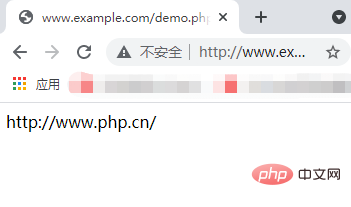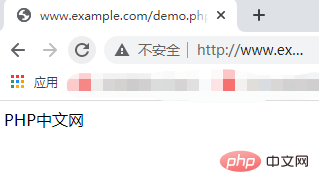 Backend Development
Backend Development
 PHP Tutorial
PHP Tutorial
 Let you understand the definition and value acquisition of PHP constants
Let you understand the definition and value acquisition of PHP constants
Let you understand the definition and value acquisition of PHP constants
In the previous article "Five minutes will take you to understand the magic methods in PHP (detailed examples)", we introduced several common magic methods in PHP in detail. Let's take a look at this article. Let’s learn about constants in PHP. I hope everyone has to help!

In the previous study, we learned about the relevant knowledge of variables in PHP, including the declaration, characteristics and data types of variables. In PHP, there are not only variables There are also constants, and constants and variables correspond to each other.
Constants and variables are similar, but after a constant is defined, it cannot be changed elsewhere in the script, nor can it be undefined. Next let's take a look at the constants in PHP.
What are PHP constants
Constants correspond to variables. Constants are simply quantities that cannot be changed. They can be viewed as is an identifier of a simple value. It should be noted that, unlike variables, constants can be used throughout the entire script. They are automatically global, that is, they can be used throughout the script.
A constant is usually composed of numbers, English letters and underscores (_), but to be precise, the constant name of a legal constant must start with an underscore. The constant name There is no need to use the $ modifier for modification. Its naming is expressed by the regular expression we learned before:
[a-zA-Z_\x7f-\xff][a-zA-Z0-9_\x7f-\xff]*
When a data does not change or we do not want it to change There are changes, then we can use PHP constants for storage. The data types of such data may be: integer, floating point, string, Boolean and array types.
Definition of PHP constants and retrieval of values
There are two ways to set defined constants in PHP, they are const definition and define() function definition, as well as setting defined constants through the constant() function, we will introduce them separately next.
Definition of PHP constants
##1) <span style="font-size: 16px;"><strong>const<span style="font-size: 18px;"></span></strong></span>Keyword
const 常量名 = 常量值;
<?php
const url = 'http://www.php.cn/';
echo url;
?>
##2) define()<strong><span style="font-size: 18px;"></span></strong>Function
The basic syntax format of the function is as follows: <div class="code" style="position:relative; padding:0px; margin:0px;"><pre class='brush:php;toolbar:false;'>define(string $name, mixed $value [, bool $case_insensitive = false])</pre><div class="contentsignin">Copy after login</div></div> It should be noted that the parameter
is a required parameter and is used to represent the constant name, that is, the identifier. Parameter $value is also a required parameter, used to represent the value of a constant. Parameter $case_insensitive is an optional parameter. When the parameter is set to TRUE, the constant is case-insensitive. By default it is case sensitive. Next, let’s take a look at the application of the define() function through an example. The example is as follows:
<?php
define('WebSite', 'PHP中文网');
echo WebSite;
?>Output result:
 Through the above example, you can understand that constants can be defined in PHP through the define() function and const. Next, let's take a look at how to get the value of a constant after defining it in PHP.
Through the above example, you can understand that constants can be defined in PHP through the define() function and const. Next, let's take a look at how to get the value of a constant after defining it in PHP.
Getting PHP constant values
##constant()<strong> <span style="font-size: 16px;"></span></strong> Function##After we have defined constants in PHP, we want To use this constant, you can use the constant() function. The basic syntax format of this function is as follows:
constant(string $name);
What you need to pay attention to is: parameter $namerepresents the name of the variable you want to operate, or it can be a variable that stores the name of a constant. However, if the constant is not defined, the returned result will be an error.
Next, let’s take a look at how to use the constant() function through an example. The example is as follows Through the above introduction, we have learned that constants can be defined and set in PHP through the const keyword, define() function and constant() function. If you are interested, you can click on "PHP Video Tutorial" to learn more about PHP knowledge. The above is the detailed content of Let you understand the definition and value acquisition of PHP constants. For more information, please follow other related articles on the PHP Chinese website!<?php
define('WebSite', 'PHP中文网');
const url = 'http://www.php.cn/';
$website = 'WebSite';
$url = 'url';
echo constant($website).'<br>';
echo constant($url);
?>

Hot AI Tools

Undresser.AI Undress
AI-powered app for creating realistic nude photos

AI Clothes Remover
Online AI tool for removing clothes from photos.

Undress AI Tool
Undress images for free

Clothoff.io
AI clothes remover

Video Face Swap
Swap faces in any video effortlessly with our completely free AI face swap tool!

Hot Article

Hot Tools

Notepad++7.3.1
Easy-to-use and free code editor

SublimeText3 Chinese version
Chinese version, very easy to use

Zend Studio 13.0.1
Powerful PHP integrated development environment

Dreamweaver CS6
Visual web development tools

SublimeText3 Mac version
God-level code editing software (SublimeText3)

Hot Topics
 1392
1392
 52
52
 36
36
 110
110
 PHP 8.4 Installation and Upgrade guide for Ubuntu and Debian
Dec 24, 2024 pm 04:42 PM
PHP 8.4 Installation and Upgrade guide for Ubuntu and Debian
Dec 24, 2024 pm 04:42 PM
PHP 8.4 brings several new features, security improvements, and performance improvements with healthy amounts of feature deprecations and removals. This guide explains how to install PHP 8.4 or upgrade to PHP 8.4 on Ubuntu, Debian, or their derivati
 7 PHP Functions I Regret I Didn't Know Before
Nov 13, 2024 am 09:42 AM
7 PHP Functions I Regret I Didn't Know Before
Nov 13, 2024 am 09:42 AM
If you are an experienced PHP developer, you might have the feeling that you’ve been there and done that already.You have developed a significant number of applications, debugged millions of lines of code, and tweaked a bunch of scripts to achieve op
 How To Set Up Visual Studio Code (VS Code) for PHP Development
Dec 20, 2024 am 11:31 AM
How To Set Up Visual Studio Code (VS Code) for PHP Development
Dec 20, 2024 am 11:31 AM
Visual Studio Code, also known as VS Code, is a free source code editor — or integrated development environment (IDE) — available for all major operating systems. With a large collection of extensions for many programming languages, VS Code can be c
 Explain JSON Web Tokens (JWT) and their use case in PHP APIs.
Apr 05, 2025 am 12:04 AM
Explain JSON Web Tokens (JWT) and their use case in PHP APIs.
Apr 05, 2025 am 12:04 AM
JWT is an open standard based on JSON, used to securely transmit information between parties, mainly for identity authentication and information exchange. 1. JWT consists of three parts: Header, Payload and Signature. 2. The working principle of JWT includes three steps: generating JWT, verifying JWT and parsing Payload. 3. When using JWT for authentication in PHP, JWT can be generated and verified, and user role and permission information can be included in advanced usage. 4. Common errors include signature verification failure, token expiration, and payload oversized. Debugging skills include using debugging tools and logging. 5. Performance optimization and best practices include using appropriate signature algorithms, setting validity periods reasonably,
 How do you parse and process HTML/XML in PHP?
Feb 07, 2025 am 11:57 AM
How do you parse and process HTML/XML in PHP?
Feb 07, 2025 am 11:57 AM
This tutorial demonstrates how to efficiently process XML documents using PHP. XML (eXtensible Markup Language) is a versatile text-based markup language designed for both human readability and machine parsing. It's commonly used for data storage an
 PHP Program to Count Vowels in a String
Feb 07, 2025 pm 12:12 PM
PHP Program to Count Vowels in a String
Feb 07, 2025 pm 12:12 PM
A string is a sequence of characters, including letters, numbers, and symbols. This tutorial will learn how to calculate the number of vowels in a given string in PHP using different methods. The vowels in English are a, e, i, o, u, and they can be uppercase or lowercase. What is a vowel? Vowels are alphabetic characters that represent a specific pronunciation. There are five vowels in English, including uppercase and lowercase: a, e, i, o, u Example 1 Input: String = "Tutorialspoint" Output: 6 explain The vowels in the string "Tutorialspoint" are u, o, i, a, o, i. There are 6 yuan in total
 Explain late static binding in PHP (static::).
Apr 03, 2025 am 12:04 AM
Explain late static binding in PHP (static::).
Apr 03, 2025 am 12:04 AM
Static binding (static::) implements late static binding (LSB) in PHP, allowing calling classes to be referenced in static contexts rather than defining classes. 1) The parsing process is performed at runtime, 2) Look up the call class in the inheritance relationship, 3) It may bring performance overhead.
 What are PHP magic methods (__construct, __destruct, __call, __get, __set, etc.) and provide use cases?
Apr 03, 2025 am 12:03 AM
What are PHP magic methods (__construct, __destruct, __call, __get, __set, etc.) and provide use cases?
Apr 03, 2025 am 12:03 AM
What are the magic methods of PHP? PHP's magic methods include: 1.\_\_construct, used to initialize objects; 2.\_\_destruct, used to clean up resources; 3.\_\_call, handle non-existent method calls; 4.\_\_get, implement dynamic attribute access; 5.\_\_set, implement dynamic attribute settings. These methods are automatically called in certain situations, improving code flexibility and efficiency.



